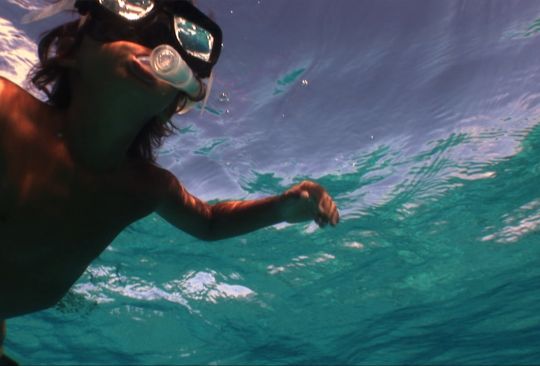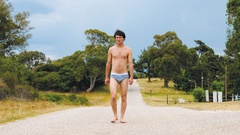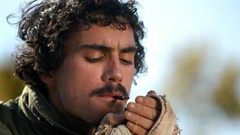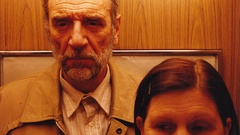Alamar (Mexico) (2009)

Part of the New Latin American Cinema
| Director: | Pedro Gonzalez-Rubio |
|---|---|
| Certificate: | Unknown |
| Length: | |
| Format: | 35mm |
| Language: | Spanish |
| Country: |
A visual poem in the stunning setting of the 2nd largest coral reef in the world, where a father shows his 5 year old boy how to go fishing.
Between documentary and fiction, this little gem has won prestigious prizes, among which the highest prize (tiger award) at the Rotterdam Film Festival.
ABOUT ALAMAR
Boys fishing
This film was entirely shot by a crew of 2 people, simply following 3 characters: a little boy, his father and his grand-father. The boy normally lives in Italy, with his mum, but he goes to visit his Mexican father, in the Coral Reefs of Banco Chinchorro. His father teaches him his trade, which is fishing.
The film simply follows them as they go fishing, and as the father teaches the son.
Documentary-fiction
This is not a fiction film: the director is simply following the father of the boy, whom he met as he was visiting Mexico, and who plays his own role in the film.
Basically the director, the father, and the cameraman would decide together what they would do for the day, and the director would film them. It's not completely a documentary as such, as the director might have suggested some of the activities undertaken, and also, it's not trying to be an exhaustive view on a particular subject.
This is what the director says about how he made the film:
"When I met Jorge (the father) and his young son Natan, I knew immediately that I wanted to do something about the special bond between them. The story is fiction but based on reality. Every evening I gave Jorge and Natan a 'task'. For example: 'Tomorrow you're going to repair the window' or' tomorrow you're going fishing'. The 'task' was meant to get them to think how they were going to do it, and therefore that they would do it 'as themselves'. If there was something not so good in a shot, I never stopped them to tell them we had to do a scene again."
Not cheesy
Here, we really have to flag that this film is NOT cheesy! The plot line of "a man and his son reunited in nature" sounds horrifically cheesy, and I really have to say - this film is not cheesy at all!! It has no music, and is not trying to be emotional. It's just filming very simple people, who have very simple lives, and who go fishing in an incredibly beautiful environment.
We're not the only ones saying it! The ROTTERDAM FILM FESTIVAL says it, here:
 "Pedro González-Rubio has made a film about an idyllic holiday that a young boy takes with his divorced father, who lives in a sort of Bounty paradise. That sounds a bit over the top, but Alamar is nevertheless pure and without a drop of sentimentalism."
"Pedro González-Rubio has made a film about an idyllic holiday that a young boy takes with his divorced father, who lives in a sort of Bounty paradise. That sounds a bit over the top, but Alamar is nevertheless pure and without a drop of sentimentalism."
THE CORAL REEFS: BANCO CHINCHORRO
The film was entirely shot in the 2nd largest coral reef on the planet, Banco Chinchorro. The reef is situated at the most southern tip of the Mexican Carribean Coast.
The reef is protected by the Mexican government, and here is what the UNESCO says:
"Banco Chinchorro Biosphere Reserve encompasses within over 144,866 ha a mosaic of open water, sea grass beds, mangroves, sand beaches and coral reefs that is considered one of the most outstanding marine sites in the region.
Banco Chinchorro is the biggest platform type reef complex system in Mexico and because of its isolated position, it represents well-preserved natural ecosystem."
Visually stunning
The film includes a lot of scenes underwater, and the whole film is visually stunning. The film has a very meditative pace, and is completely immersed in nature, in its environment, in a setting that is very far from civilisation and from what we know.
"Elegantly photographed by Mr. González-Rubio, “Alamar” makes every shot a composition." - THE NEW YORK TIMES
REVIEWS, AWARDS

"I loved every frame of it." - TIME OUT
"I doubt I'll see a more lovely film this year" -THE BIG ISSUE
“DO NOT MISS the Mexican film ALAMAR …ONE OF THE YEAR’S BEST’” - TIME OUT FILM
“A revelation” - SIGHT AND SOUND
Shot by a crew of two (the director handling sound), it's a charmer, inviting that ambiguous compliment "deceptively simple"." - THE GUARDIAN
"This is poetic filmmaking that foregrounds the peace and beauty of a fragile environment." - EDINBURGH FILM FESTIVAL
"Familial stories tend toward the melodramatic and the gratuitously messy; this pastoral-poetic Mexican film proves that simpler is almost always better. A Mayan father takes his ten-year-old son on one last fishing trip before divorce and relocation separate them; what emerges is a quiet, gorgeously photographed portrait of a long goodbye. Do not miss it." - TIME OUT NEW YORK
AWARDSWinner, Tiger Award, Rotterdam Film Festival 2010
Winner, Grand Jury Prize, Miami Film Festival 2010
Winner, New Directors Award, San Francisco International Film Festival
Other films in the New Latin American Cinema:

14
Film: The Headless Woman (Argentina) (2008)
14 Nov 2010, 7:30 p.m.
Lucrecia Martel is one of the most promising Argentinian directors around. She has won prizes at some of the most prestigious festivals, and we are very proud to be showing her latest film. A “brilliant, maddeningly enigmatic puzzle of a movie” (The New York Times), about a woman confronted with guilt, and the history of Argentina.

18
Film: Hiroshima (Uruguay) (2009)
18 Nov 2010, 7:30 p.m.
Incredible film, at once experimental in its form, challenging in its content, and visually beautiful: this is a non-identified floating object. Best described as a silent musical: no dialogue is heard at all throughout the film, but music from unsigned Uruguay rock/metal/psychedelic bands make the film fly. 24 hours in the life of a singer with autistic tendencies.

25
Film: The Dog Pound (La Perrera, Uruguay) (2006)
25 Nov 2010, 7:30 p.m.
Winner of the Best Film Award at the Rotterdam Film Festival, and elected Best Uruguayan Film of 2006 by the country’s Association of Film Critics, this is a slow and contemplative film about David, a 25-year-old who loves smoking pot, and has a heroic capacity for doing nothing. Tragicomedy of a slacker, shot on 16mm.

28
Film: Whisky (Uruguay) (2003)
28 Nov 2010, 7:30 p.m.
Multi-awarded at some of the most prestigious international film festivals (Cannes, Tokyo, Chicago, Peru, Spain, etc), this is a very subtle film about human communication, or the impossibility of it. The owner of a sock factory asks one of his employees to act as his wife during the visit of his brother.





